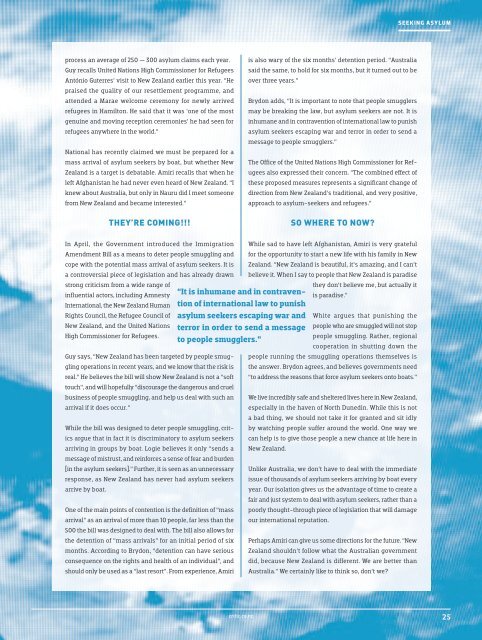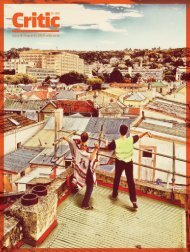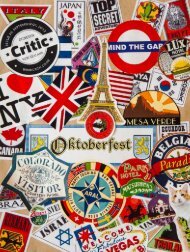You also want an ePaper? Increase the reach of your titles
YUMPU automatically turns print PDFs into web optimized ePapers that Google loves.
process an average of 250 — 300 asylum claims each year.<br />
Guy recalls United Nations High Commissioner for Refugees<br />
António Guterres’ visit to New Zealand earlier this year. “He<br />
praised the quality of our resettlement programme, and<br />
attended a Marae welcome ceremony for newly arrived<br />
refugees in Hamilton. He said that it was ‘one of the most<br />
genuine and moving reception ceremonies’ he had seen for<br />
refugees anywhere in the world.”<br />
National has recently claimed we must be prepared for a<br />
mass arrival of asylum seekers by boat, but whether New<br />
Zealand is a target is debatable. Amiri recalls that when he<br />
left Afghanistan he had never even heard of New Zealand. “I<br />
knew about Australia, but only in Nauru did I meet someone<br />
from New Zealand and became interested.”<br />
THey’re coming!!!<br />
In April, the Government introduced the Immigration<br />
Amendment Bill as a means to deter people smuggling and<br />
cope with the potential mass arrival of asylum seekers. It is<br />
a controversial piece of legislation and has already drawn<br />
strong criticism from a wide range of<br />
influential actors, including Amnesty<br />
International, the New Zealand Human<br />
Rights Council, the Refugee Council of<br />
New Zealand, and the United Nations<br />
High Commissioner for Refugees.<br />
Guy says, “New Zealand has been targeted by people smuggling<br />
operations in recent years, and we know that the risk is<br />
real.” He believes the bill will show New Zealand is <strong>not</strong> a “soft<br />
touch”, and will hopefully “discourage the dangerous and cruel<br />
business of people smuggling, and help us deal with such an<br />
arrival if it does occur.”<br />
While the bill was designed to deter people smuggling, crit-<br />
ics argue that in fact it is discriminatory to asylum seekers<br />
arriving in groups by boat. Logie believes it only “sends a<br />
message of mistrust, and reinforces a sense of fear and burden<br />
[in the asylum seekers].” Further, it is seen as an unnecessary<br />
response, as New Zealand has never had asylum seekers<br />
arrive by boat.<br />
One of the main points of contention is the definition of “mass<br />
arrival” as an arrival of more than 10 people, far less than the<br />
500 the bill was designed to deal with. The bill also allows for<br />
the detention of “mass arrivals” for an initial period of six<br />
months. According to Brydon, “detention can have serious<br />
consequence on the rights and health of an individual”, and<br />
should only be used as a “last resort”. From experience, Amiri<br />
“It is inhumane and in contravention<br />
of international law to punish<br />
asylum seekers escaping war and<br />
terror in order to send a message<br />
to people smugglers.”<br />
critic.co.nz<br />
is also wary of the six months’ detention period. “Australia<br />
said the same, to hold for six months, but it turned out to be<br />
over three years.”<br />
Brydon adds, “It is important to <strong>not</strong>e that people smugglers<br />
may be breaking the law, but asylum seekers are <strong>not</strong>. It is<br />
inhumane and in contravention of international law to punish<br />
asylum seekers escaping war and terror in order to send a<br />
message to people smugglers.”<br />
The Office of the United Nations High Commissioner for Ref-<br />
ugees also expressed their concern. “The combined effect of<br />
these proposed measures represents a significant change of<br />
direction from New Zealand’s traditional, and very positive,<br />
approach to asylum-seekers and refugees.”<br />
so WHere To noW?<br />
While sad to have left Afghanistan, Amiri is very grateful<br />
for the opportunity to start a new life with his family in New<br />
Zealand. “New Zealand is beautiful, it’s amazing, and I can’t<br />
believe it. When I say to people that New Zealand is paradise<br />
they don’t believe me, but actually it<br />
is paradise.”<br />
White argues that punishing the<br />
people who are smuggled will <strong>not</strong> stop<br />
people smuggling. Rather, regional<br />
cooperation in shutting down the<br />
people running the smuggling operations themselves is<br />
the answer. Brydon agrees, and believes governments need<br />
“to address the reasons that force asylum seekers onto boats.”<br />
We live incredibly safe and sheltered lives here in New Zealand,<br />
especially in the haven of North Dunedin. While this is <strong>not</strong><br />
a bad thing, we should <strong>not</strong> take it for granted and sit idly<br />
by watching people suffer around the world. One way we<br />
can help is to give those people a new chance at life here in<br />
New Zealand.<br />
Unlike Australia, we don’t have to deal with the immediate<br />
issue of thousands of asylum seekers arriving by boat every<br />
year. Our isolation gives us the advantage of time to create a<br />
fair and just system to deal with asylum seekers, rather than a<br />
poorly thought-through piece of legislation that will damage<br />
our international reputation.<br />
Perhaps Amiri can give us some directions for the future. “New<br />
Zealand shouldn’t follow what the Australian government<br />
did, because New Zealand is different. We are better than<br />
Australia.” We certainly like to think so, don’t we?<br />
sEEKiNG AsYLUM<br />
25














